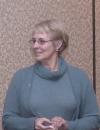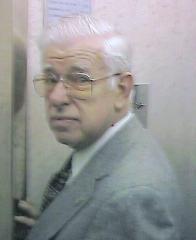Next Meeting - Tuesday, Nov. 5 - at the Sheraton, as usual. Our business-type meeting, with unknown opening ceremonies, followed by discussion of what we've done lately, what we're doing next, and what we're thinking about doing, sometime.... Hopefully, there will be some ideas about fundraising, because difficult though that subject can be, for some of our service work we can't go in person, so we send our dollars to do the work. We aren't going to do the UW Concessions stand any more - the contract offered by the new vendor was unacceptable. They probably knew that.
Last time, Pres. LINDA opened the meeting, we had a “Pledge of Attendance”, a “Fiddler With A Woof”, and no badge box. We all knew who we were, though, and we didn't need badges to welcome DALE ST. JOHN and CHARLIE LIBERTY, whom we hadn't seen in a while. They, along with WALT PRIDHAM and DALE MUELLER, were there to celebrate their Lion Birthdays, and between them, they had a lot of Lion service. CHARLIE had 17 years, WALT had 32, DALE ST. JOHN 44 and DALE MUELLER, 48! These Lions are the bedrock on which a good Club stands, and your Editor can't help pointing out that he sponsored two of them. DALE ST. JOHN's son Dennis was a guest, and since he brought DALE with him, or vice versa, we hope to see him often. CHARLIE LIBERTY brought his wife Tricia, who has met some of us while helping CHARLIE on projects.
We had the usual gift drawing, and Dennis, his father DALE St. J, JIM SCHUTZ, and speaker and former Lion Guy Eichsteadt were the winners. All except Dennis remember the Thunderbird, but, alas, it did not materialize. JACK HEIM displayed yet another of his talents, improvising “Happy Birthday” on the violin.
The Board has come up with one fundraising idea, which has the benefit of no inventory to stock and deliver. A raffle is planned, with cash, Packer and Badger tickets as prizes. Tentatively, only 400 tickets, at $25 a pop. In order to be successful, we all need to participate.
SCOTT GROVER reminded us of the Highway Cleanup, which has since been successfully completed. The usual array of golf balls and junk, but no real surprises. The weather cooperated, the job was done on time and seemingly a good time was had by all.
JIM SCHUTZ says two Vision Screenings are planned, and we've been getting requests for more. Help is needed for these screening sessions, which are among the finest “hands on” projects we have, and you can train to be a screener (there are now more than one format) or simply help out at setting up, crowd management, and takedown. See JIM to find out how.
Former MCLC Lion Guy Eichsteadt was introduced as the speaker. He is a Boy Scout executive, and left Madison some years back for the opportunity to establish and operate a Scout program in Japan, for the children of American armed forces personnel stationed there. He told us about the experience of living in Japan, shattering some stereotypes in the process and reinforcing a few others. He found it a safe and friendly place - when the Emperor declared that the war was over, and the Americans should be well-received, that is what happened. He said there was no theft - if you accidentally left something behind someone would come running after you to return it.
He noted that the four main islands of Japan, Hokkaido, Honshu, Shikoku, and Kyushu, stretch from the latitudes of Alaska to Chile, which means a huge range of climate. The Shinto religion, indigenous to Japan, is a belief in multiple spirits, good and evil, many based on natural objects. Buddhism is also present, and the Great Buddha statue dates to the 12th Century. There are Shinto shrines everywhere, and the atmosphere around them is park-like and peaceful. Cherry blossoms are widespread and highly popular.
His house, an “old style” was mainly made of wood. There are many of those, and they are generally cold, drafty, and not good for winter. There are many small “mom and pop” stores, selling just about everything, but homes have little or no refrigeration so most Japanese shop for fresh food every day. Western-style fast-food restaurants are now fairly common, with McDonalds and smaller individual ones like “Mel's Café” and “Lost California.” Japanese auto traffic drives on the left, and there is a good system of high-speed trains. Mixed in with the modern are temples, old castles, and reminders of the history of ancient clan battles. It sounded as though he enjoyed living there, and it was a very interesting program.

